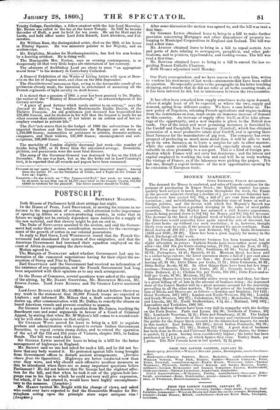POSTSCRIPT.
SATURDAY Moffifnm.
Both Houses of Parliament held short sittings last night.
In the House of Peers, Lord BROUGHAM, in moving for returns in re- ference to the importation of cotton, called attention tothe importance of opening up Africa as a cotton-producing country, in order that in future we might not be entirely dependent upon America for a supply of the raw material, and that slavery might be put an end to. The Duke of NEWCASTLE assented to the motion, and said the Govern- ment had under their serious consideration measures for the encourage- ment of the growth of cotton in our colonial possessions. In reply to Earl GREY, Lord WODEHOUSE stated that the French Go- vernment had abandoned their system of free emigration, and that the American Government had increased their squadron employed on the -coast of Africa in suppressing the slave-trade.
Motion agreed to.
The Marquis of NORMANEY asked whether Government had any in- formation of the rumoured negotiations having for their object the an- nexation of Savoy and Nice to France. Earl GRANVILLE said the Government had received no information of the existence of any negotiation, and the French Government had long been acquainted with their opinions as to any such arrangement.
Iri the House of Commons, several questions were asked at the opening of the sitting, by Mr. DARBY Giurrrrws,. Mr. MONCICTON MitifEs, Mr. EDWIN JAMES. Lord JOHN RUSSELL and Sir GEoRGE LEWIS answered them.
Lord dorm RUSSELL told Mr. Griffiths that he did not believe there was any truth in the statement that 30,000 French troops are expected at Leghorn ; and informed Mr. Mines that a draft convention has been drawn up, after communication with Mr. Dallas, to remedy the abuses on board American vessels and prevent cruelties to seamen. Sir GEORGE Lawn replied to a question from Mr. James touching the Smethurst case and some arguments in favour of a Court of Criminal Appeal, by stating that when Mr. M'Mahon's bill comes to a second read- ing ho will state his opinion on that suliject. Sir CHARLES Woon moved for leave to bring in a bill to regulate probate and administration with respect to certain Indian Government Securities, to repeal certain stamp duties, and to extend the operation of the act of the 22d and 23d years of Victoria, chapter 39th, to Indian Bonds. The bill was read a first time.
Sir GEORGE Law's moved for leave to bring in a bill for the better management of highways in England. Mr. BRIGHT said no one had asked for such a bill, and he did not be- lieve that any body wanted it. He protested against bills being brought from Government offices to disturb ancient arrangements. (Derisive cheers from the Opposition). Highways are better conducted now than ever they were and why should such offensive needless measures as this be introduced when there are so many important questions before Parliament ? He did not believe that Sir George had the slightest affec- tion for the bill, and that when he took it out of the pigeon-hole lan- guage rose to his lips to which he could not very well give expression, but which, if he had uttered it, would have been highly uncomplimen- tary to the measure. (Laughter.) Mr. HARDY twitted Mr. Bright with his change of views, and asked who could ever have expected to find the Honourable Member for Bir- mingham acting upon the principle stare super antiques vias ? (Laughter.)
After some discussion the motion was agreed to, and the bill was read a first time.
Sir GEORGE LEWIS obtained leave to bring in a bill to make further provision concerning Mortgages and other dispositions of property be- longing to Municipal Corporations in England and Ireland. The bill was read a first time.
Mr. AYRTON obtained leave to bring in a bill to repeal certain Acts and parts of Acts relating to newspapers, pamphlets, and other pub- lications, and to printers, typefourniers, and reading-rooms. The bill was read a first time.
Mr. BOWYER obtained leave to bring in a bill to amend the law re- garding Roman Catholic Charters.
Both Houses adjourned until Monday.


























 Previous page
Previous page